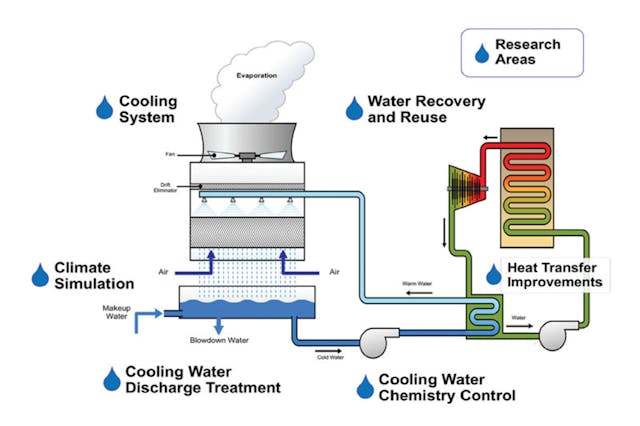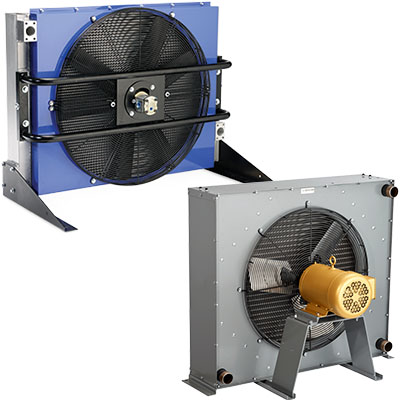The Function of Heat Transfer Solutions in Sustainable Energy Solutions for the Future
Heat transfer systems are essential in the mission for lasting power solutions. They enhance thermal energy management, enhancing the efficiency of eco-friendly modern technologies. By utilizing mechanisms like convection, conduction, and radiation, these systems minimize energy losses. Their role in solar thermal and geothermal applications is particularly significant. As innovations emerge, the capacity for further developments raises essential questions regarding future energy methods. What advancements will form the landscape of sustainable power?
Recognizing Heat Transfer Systems

The Relevance of Thermal Energy Management
Reliable thermal power administration is necessary for making the most of power effectiveness and reducing waste in various systems. By controling temperature level and enhancing Heat transfer processes, organizations can noticeably lower power intake and operational costs. Reliable management involves the execution of advanced modern technologies and practices that check and manage thermal problems within systems, guaranteeing that power sources are utilized effectively. In enhancement, appropriate thermal energy monitoring adds to minimizing greenhouse gas exhausts, aligning with worldwide sustainability objectives. It likewise improves system dependability and performance, resulting in boosted product high quality and longer devices life expectancy. Eventually, prioritizing thermal energy management is a crucial action in the direction of developing much more lasting power remedies and cultivating a liable strategy to power intake in commercial and property contexts.
Applications of Heat Transfer in Renewable Power
While numerous renewable resource resources promise sustainability, the effective application of Heat transfer plays an essential function in their efficiency. In wind energy systems, Heat transfer is made use of for turbine component air conditioning, boosting performance and durability. Geothermal power relies upon effective Heat exchange in between the earth's subsurface and the liquid circulating in the system, making the most of power removal. Biomass power procedures likewise gain from Heat transfer, as it aids in transforming natural products into usable fuel via pyrolysis and gasification. Furthermore, in hydropower, maintaining optimal temperature levels in storage tanks can improve power output. Each of these applications shows the critical importance of Heat transfer systems in boosting renewable resource modern technologies, ultimately adding to a more lasting energy future.
Enhancing Solar Thermal Power Performance
As solar thermal power systems remain to advance, boosting their efficiency has actually ended up being vital for making the most of energy result. Developments in Heat transfer modern technologies, such as improved thermal storage materials and ingenious Heat exchangers, play a substantial function in boosting efficiency. By making use of innovative materials that have exceptional thermal conductivity, systems can capture and transfer Heat extra efficiently. Furthermore, integrating radar that follow the sun's path assurances that collectors receive ideal solar exposure throughout the day. Making use of nanotechnology in solar absorbers can additionally increase power absorption prices. Furthermore, integrating computerized control systems aids manage temperature levels and manage energy distribution effectively, resulting in lowered losses and improved total system performance. These improvements lead the way for more sustainable solar thermal power solutions in the future.
Geothermal Home Heating: A Sustainable Service
Geothermal heating offers a viable choice for lasting energy, supplying significant ecological benefits with lowered greenhouse gas exhausts. Its efficiency and cost-effectiveness make it an appealing alternative to typical heating unit. Nevertheless, obstacles connected to application has to be dealt with to optimize its potential influence.
Environmental Benefits of Geothermal
Although conventional heating approaches add substantially to greenhouse gas discharges, geothermal home heating provides an engaging alternative that minimizes environmental influence. By utilizing the Earth's interior Heat, geothermal systems make use of a renewable resource resource, substantially decreasing dependence on nonrenewable fuel sources. This technique produces marginal carbon emissions, making it a cleaner alternative for industrial and household heating. i thought about this Furthermore, geothermal systems promote power performance, as they need less energy compared to conventional heating unit. DVS Heat Transfer Systems. The utilization of geothermal power also helps in reducing air pollution, improving local air top quality and look at this now public health. As a sustainable solution, geothermal heating sustains environment adjustment mitigation efforts, positioning itself as a necessary part in the change towards a greener future
Performance and Cost-Effectiveness
Exactly how does geothermal home heating determine up in regards to efficiency and cost-effectiveness contrasted to conventional heater? Geothermal heating shows exceptional efficiency, usually attaining a coefficient of efficiency (POLICE OFFICER) of 3 to 5, implying it produces three to five units of Heat for each device of electricity taken in. This effectiveness converts into lower operating prices, specifically in areas with steady geothermal resources. Preliminary installment expenses can be higher than conventional systems; however, long-term savings on power costs and reduced upkeep expenses can offset these in advance investments. In addition, many governments incentivize geothermal systems through rebates and tax credit reports, boosting their cost-effectiveness. Overall, geothermal heating arises as a financially practical and lasting alternative to more standard heating options.
Implementation Obstacles and Solutions
Various obstacles can hinder the widespread execution of geothermal furnace, regardless of their clear benefits as a sustainable power option. High preliminary installment prices commonly prevent financiers and homeowners, making funding a significant obstacle. Additionally, the geographical restrictions of appropriate geothermal sites restrict access in specific areas. Regional regulations and permitting procedures can likewise complicate job growth, causing hold-ups. Public awareness and understanding of geothermal systems continue to be low, preventing approval. To resolve these difficulties, targeted education and learning campaigns can improve open secret, while government motivations can alleviate economic problems. Teaming up with regional authorities to streamline regulations might promote smoother project approvals, ultimately advertising the fostering of geothermal home heating as a practical, sustainable power option.
Innovations in Heat Transfer Technologies
Technologies in Heat transfer modern technologies play a vital role in improving energy efficiency and sustainability. Advanced Heat exchangers and stage change products go to the center of these advancements, supplying substantial enhancements in thermal administration. These technologies not just maximize energy use yet also add to decreasing environmental impact in various applications.
Advanced Heat Exchangers
Advanced Heat exchangers play an important function in enhancing energy effectiveness throughout different applications in lasting power services. These gadgets assist in the transfer of Heat between 2 or even more liquids, noticeably minimizing energy navigate to this website intake in processes such as industrial home heating, cooling, and power generation. Technologies in materials and design, such as using nanofluids and portable configurations, have actually led to improved thermal efficiency and reduced dimension needs. In addition, innovations in digital surveillance and control systems permit optimized procedure, more enhancing effectiveness. By decreasing waste Heat and optimizing energy healing, advanced Heat exchangers add to lower carbon footprints and sustain the shift towards eco pleasant modern technologies. Their proceeded development is important for accomplishing international power sustainability objectives.
Stage Adjustment Products
The combination of phase adjustment materials (PCMs) into Heat transfer innovations stands for a substantial advancement in energy monitoring and performance. PCMs take in and launch thermal energy during their phase adjustments, enabling efficient temperature guideline in structure products and power systems. By saving excess Heat during top durations and launching it when demand rises, PCMs add to fill shifting and energy preservation - DVS Heat Transfer Systems. This ability boosts the performance of renewable resource systems, particularly in solar thermal applications. Additionally, PCMs can boost the thermal convenience of interior settings, minimizing reliance on standard home heating and cooling approaches. As developments in PCM solutions proceed to emerge, their function in sustainable power options is positioned to grow, providing appealing methods for future study and application

Future Prospects for Heat Transfer in Sustainable Energy
As the demand for sustainable power remedies continues to rise, the function of Heat transfer systems is coming to be increasingly vital fit future innovations. Technologies in layouts and products are anticipated to improve effectiveness in Heat transfer, decreasing power losses in various applications. The assimilation of sophisticated thermal storage systems, such as stage adjustment products and thermochemical storage space, will make it possible for better monitoring of power sources. Research study right into nanofluids and biomimetic Heat exchangers might additionally maximize thermal efficiency. The fostering of clever innovations will certainly allow for real-time monitoring and adaptive control of Heat transfer processes. These developments are positioned to greatly contribute to the general efficiency and sustainability of energy systems, leading the way for an extra energy-efficient future.
Frequently Asked Inquiries
How Can Individuals Implement Heat Transfer Solution in the house?

Individuals can carry out Heat transfer systems in your home by installing energy-efficient home appliances, utilizing radiant heat, and maximizing insulation. These procedures enhance power effectiveness, lower expenses, and promote lasting methods in domestic atmospheres.

What Are the Costs Connected With Mounting Heat Transfer Systems?
The expenses related to installing Heat transfer systems vary extensively, normally incorporating tools, setup labor, and maintenance. Factors such as system kind, home size, and regional laws greatly affect the total expense included.
Are There Federal Government Incentives for Heat Transfer System Installations?
Federal government incentives for Heat transfer system setups vary by region and can consist of tax refunds, grants, and credit ratings. These economic advantages intend to motivate fostering, ultimately advertising power performance and minimizing ecological effect within areas.
Just How Do Heat Transfer Systems Effect Power Expenses?
Heat transfer systems especially influence power costs by maximizing energy performance. By improving the transfer of Heat, these systems decrease energy intake, bring about reduced energy prices and developing a much more sustainable strategy to energy administration.
What Maintenance Is Required for Heat Transfer Systems?
Upkeep for Heat transfer systems includes routine assessments, cleaning of parts, inspecting liquid levels, making sure correct insulation, and replacing worn components. These jobs assist keep effectiveness, protect against malfunctions, and lengthen the system's functional life-span.
These systems assist in the movement of thermal power from one tool to an additional, making it possible for the transfer of Heat for energy, air conditioning, or home heating generation purposes. Geothermal power relies on reliable Heat exchange in between the planet's subsurface and the fluid circulating in the system, making the most of energy removal. Furthermore, geothermal systems advertise energy efficiency, as they require less energy contrasted to standard home heating systems. Advanced Heat exchangers play a crucial function in enhancing power efficiency across numerous applications in lasting energy solutions. Heat transfer systems significantly affect energy costs by enhancing energy efficiency.